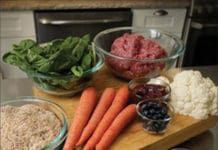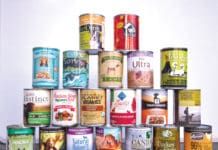Home Search
raw%20dog%20food - search results
If you're not happy with the results, please do another search
10 Weight Loss Tips for Senior Dogs
Older dogs, like older people, have an easier time getting around if they aren't overweight. Losing weight can be a challenge for dogs at any age, but more so as dogs grow older. Still, weight loss for dogs is worth the effort. Slender dogs not only get around more easily, but also actually live longer. A 14-year study showed that dogs fed 25 percent fewer calories than their free-fed littermates lived nearly two years longer, showed fewer visible signs of aging, and enjoyed an extra three years of pain-free mobility before developing canine arthritis.
Canine Parvovirus Vaccine, Symptoms, and Treatment
How is parvo spread among dogs? Whole Dog Journal discusses a number of canine parvovirus prevention and treatment approaches taken by veterinarians and dog guardians today. Reactions to parvovirus vary widely. In a world where parvovirus is literally everywhere, parvo kills some dogs and leaves others unscathed. And in the debate about parvo vaccination, some people vaccinate their dogs early and often, while others refuse to vaccinate against parvo at all.
Treating Your Dog’s Hypothyroidism
Hypothyroidism (underactive or low thyroid) is a common disorder in dogs. A variety of breeds are known to be genetically predisposed, including the Labrador Retriever, Golden Retriever, Dachshund, Boxer, Doberman, and Cocker Spaniel. (It's normal for sighthounds such as the Greyhound to have relatively low thyroid levels as a result of their unique physiology; these levels are not a sign of pathology in these breeds.)
Miscellaneous Facts about Nature’s Variety
1. Nature's Variety had revenue in 2015 of $126.7 million. 2. The company has two production facilities in Lincoln and three warehouse facilities, including frozen. In 2008, Catterton, an international private equity firm, invested in Nature's Variety and CEO Reed Howlett came on board. In 2009, the company headquarters was moved from Nebraska to St. Louis, though manufacturing and warehouse operations remain in Lincoln. …
The Boarding Kennel Checklist
Wags Hotel in Sacramento
Parvo Victim # 2
The name Ray Carlisle is synonymous with Doberman Pinschers. A breeder and exhibitor for 40 years, a show judge for the last 20 years, and a former president of the Doberman Pinscher Club of America, the United Doberman Club, and the American Working Dog Federation, the New York resident travels the world on behalf of his favorite breed. I vaccinated my dogs for many years
Preparing Your Dog for a Successful Surgery
The word surgery
Next-Level Selection Criteria
For some dog owners, a better dry dog food is just one more step on a journey to finding the healthiest diet in the...
Trifexis and Adverse Effects
A few weeks ago, the talk of the dog-related section of the Internet was Trifexis, the oral flea-control medication introduced a year or so ago by Elanco Animal Health. News reports alleged that more than 700 dogs have been killed by adverse reactions to this drug. To verify that number, I looked to the FDA's Center for Veterinary Medicine (CVM), the agency responsible for collecting and analyzing reports of adverse effects of veterinary drugs on animals.
Whole Foods in Vet-Prescribed Dog Food
Three months ago, I asked, Why can't veterinary nutritionists design recipes that meet most nutritional needs through the use of whole foods
Whole Dog Journal’s 2013 Canned Dog Food Review
Price is the most commonly cited reason that people prefer to feed dry food to their dogs; canned food is far more expensive to feed than dry food. Owners of large dogs or multiple dogs rarely feed canned food as anything other than an occasional treat, for this reason alone.Of course, there are other objections, too.
The Benefits of Canned Dog Food: WDJ’s Canned Dog Foods 2013
Wet dog food, a.k.a. “canned” dog food, is not nearly as popular as dry food. The total sales figure for dry pet food in the U.S. last year (more than $12.7 billion) was more than 21/2 times that of wet pet food (almost $4.8 billion). I understand the reasons for this, but wish it wasn’t so. Canned food is actually a much healthier diet for dogs than kibble.









